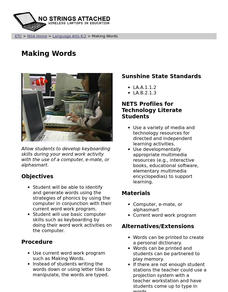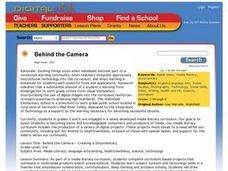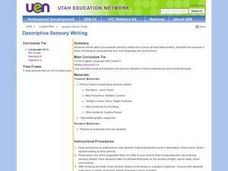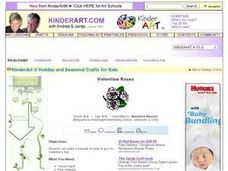Curated OER
Jabberwocky-Identifying Adjectives
Elementary learners identify adjectives in sentences. They read the poem "Jabberwocky" by Lewis Carroll and highlight the adjectives. A good supplemental lesson if you are studying Lewis Carroll and/or "Jabberwocky."
Curated OER
Classifying Information About a Main Idea
Elementary learners explore language arts by completing a text identification activity. They discuss the importance of a main idea in a story or paper and how to present it properly. Then they practice identifying the main idea in sample...
Curated OER
Rhythm in Motion
Any age of elementary student can demonstrate their understanding of the connections of elements of art and music by creating their own slit song. You will investigate and study the Melanesian Slit Song with Kindergartners through Junior...
Curated OER
Making Words
Young writers identify and generate words using the strategies of phonics on the Making Words computer program. Words are typed instead of having to use tiles or paper. Extension activities such as playing the memory game, drawing...
Curated OER
Book Review Worksheet
Young readers use this book review learning exercise to evaluate a book they have read. After recording the title and author of a book, reviewers color in the appropriate bubble rating the book as exciting, boring, funny, or scary. They...
Curated OER
Red and Blue
Young elementary learners listen to the story Red & Blue and participate in a collaborative project where they paint a picture using abstract shapes. Then they interpret classmates' abstract shapes and write or tell a story about...
Curated OER
Behind the Camera
Scholars, in groups, gather information relating to community health care. Using video and digital cameras, they interview members of a health center staff. They then compile digital images, select music, and narrate a story about their...
Curated OER
Michelle Kwan: Heart of a Champion
Who is a champion to your class? Elementary and middle schoolers think of a role-model from their lives. Then, in their journals, they write evidence of that person's perseverance. They identify the character trait of perseverance with...
Curated OER
Monet And Impressionism
Students create and discuss works of Impressionism in this lesson plan for the elementary classroom. Emphasis is placed on Monet's "Water Lilies" and the Bridge or Gardens at Giverny.
Curated OER
Descriptive Prompt: Precise Language
Incorporate sensory details into a piece of descriptive writing. First, elementary and middle schoolers improve a piece of writing by using precise, vivid language, as well as appropriate word choice. They then listen to a variety of...
Curated OER
/sh/ Sound Work
What letters create the /sh/ sound? Have your elementary learners study the sound, write different words that use the sound in their letter boxes, and read One Fish, Two Fish, Red Fish, Blue Fish! After this mini-lesson, can your...
Curated OER
School-Home Links: Compound Words #2
Provide elementary learners additional practice with compound words. First they identify the two independent words used to create a compound word, and then they search for examples in their daily life. Where can you read or hear compound...
Curated OER
Abstract Flowers Inspired By Georgia O'Keeffe
Young scholars create a drawing of a flower using Georgia O'Keeffe as their inspiration, then develop skills in drawing and composition. They explain the difference between realistic and abstract.
Curated OER
Easter Baskets
Students create Easter baskets using paperclips, string, balloons, and paper mache techniques in this early-elementary Art instructional activity. Due to drying times for the paper mache it is recommended to spread this Art...
Curated OER
Valentines Roses
Students create bouquets of roses using tissue paper, pipe cleaners, masking tape, paint, and construction paper in this early elementary art lesson plan. A possible extension includes making Vlentine's Day cards to go along with the...
Curated OER
Turkey Centerpieces
Young scholars create "turkey centerpieces" in this easy elementary art lesson using apples, toothpicks, construction paper, and gumdrops. The lesson includes a materials list and a step-by-step list of instructions to create the turkey...
Curated OER
Maracas
Students create Maracas out of various supplies while learning about percussion instruments in this Art and Music lesson for the elementary and middle level classroom. Detailed directions for two different methods are given.
Curated OER
Combating Corrosion
Study corrosion on bronze statues with a hands-on lesson. As pupils place a penny in water with salt, they observe the changes in the penny throughout a period of a week. They then analyze the pre-conservation and the post-conservation...
Curated OER
Presidents
Students conduct a research project. For this United States Presidents lesson, students draw a presidents name out of a box and complete a research activity on their president. Research options include writing a two page paper, create a...
Curated OER
Oh Picasso!
Learners identify the painter Picasso as a famous Spanish cultural figure, name at least one of Picasso's painting styles and describe aspects of Picasso's Blue Period. They create their own Blue Period inspired work of art.
Curated OER
Capturing the Moment in 3-D
Young scholars analyze the sculpture "Rearing Horse" by Adriaen de Vries. In this visual arts lesson, students examine the sculpture and then draw and sculpt animals from life, trying to capture a moment frozen in time.
Curated OER
Leprechaun Dust
Learners make "leprechaun dust" in this short art lesson plan using Jello instant pistachio pudding, small jars, milk, and spoons. Ideal for celebrating St. Patrick's Day with early-elementary students. Can be combined with the reading...
Curated OER
View Finder Painting
Creative thinkers create a paper "view finder." They place it on a magazine picture in different ways until they find an image to paint. They do this until they have drawn and then painted an entire paper filled with found art.
PBS
Blue Ribbon Readers: Drawing Inferences
Model for young readers how to use illustrations, chapter titles, and events in a story to draw inferences and make predictions. Learners then practice these essential comprehension strategies by drawing inferences for another section of...

























